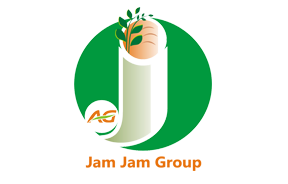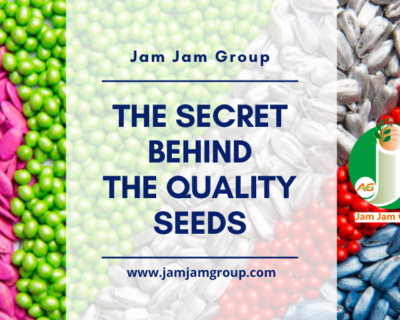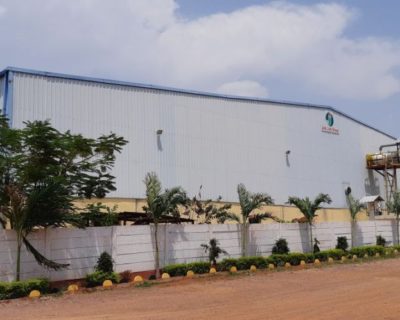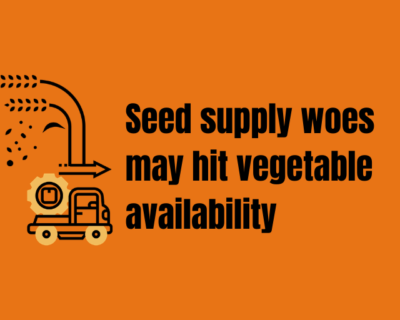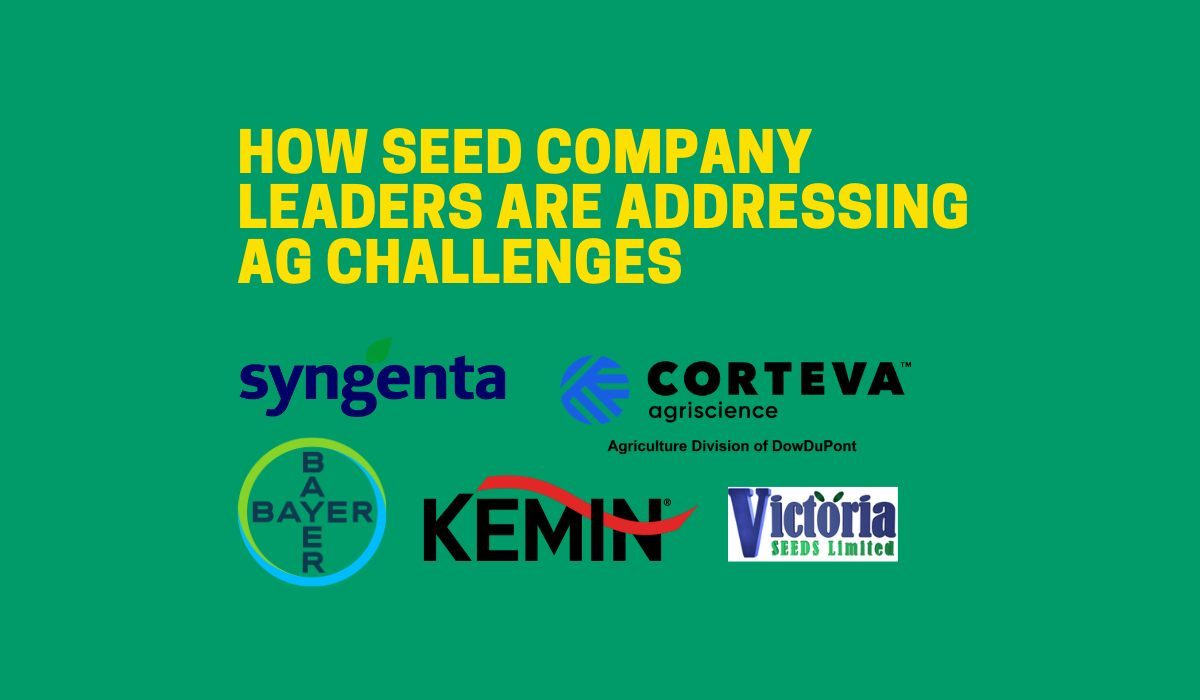
How seed company leaders are addressing AG challenges
A panel of top leaders in the private sector of production agriculture, including Corteva, Syngenta, and Bayer, sat down at the World Food Prize in Des Moines to talk about global challenges. Here are a few takeaways. (Remarks have been edited for brevity and clarity.)
ARE WE ON TRACK TO FEED 9 BILLION PEOPLE BY THE YEAR 2045?
Jim Collins, CEO of Corteva Agriscience: We need to double productivity while improving sustainability. We’ve made good progress, but that pace is not fast enough or steep enough to rise to the challenge. We need to use biotechnology. We need to educate small holder farmers in Africa and share agronomic information. We’ve made good progress, but at the rate of change we’re on today, we’re still going to fall short.
Liam Condon, president of Bayer Crop Science: The challenges in agriculture are getting more and more difficult, particularly with climate change. The growing population is limiting natural resources, land, and water. We will need a lot more innovation. The food system is not on a sustainable trajectory. We have over 800 million people who go to bed hungry every night. We have another 2 billion who are suffering from malnourishment. So half of the global population is not being served by the current food system adequately. Production is still too resource intense. We’ve made great progress, but if we continue at the pace that we have in the past, this is not a sustainable trajectory. Clearly we need a lot more innovation to get to a healthy, sustainable food system.
Erik Fyrwald, CEO of Syngenta: We have big challenges. First, we have to help farmers adapt to climate change. Think about what’s happened in the Midwest this year – the worst flooding in the history of the United States. At the same time we have the worst drought in the history of Australia and the highest temperatures in France. We have dramatic weather events we have to help farmers deal with. We have to do that with technology, agronomic advice, and digital tools. We need science-based regulatory processes around the world so we can keep bringing better and better technology to help farmers deal with climate change. At the same time, we have to help farmers reduce impact on climate change. Agriculture and food value chains contribute 25% of greenhouse gas emissions. We are reducing that impact, but we have to do more. We have to increase yields, reduce waste, feed the world with less land, stop deforestation, and reforest. That takes technology and training. In the developing world (like Africa), we have to do more. We have to help farmers earn a decent living, take care of the land, reduce the impact of climate change, and produce more food to feed the world.
Josephine Okot, managing director and founder of Victoria Seeds, Kampala, Uganda: In the context of feeding Africa, there are three areas that must be addressed if we are to achieve that. We need to empower women, we need public investment in research and expansion, and we need political will. In Uganda, the labor force in crop production is 76% women. Men are mostly in fisheries and livestock. The primary tool is still the hand hoe. That sad reality is a disgrace to humanity. You cannot feed any population without mechanization. Financing is a big issue. Interest rates are 20%. The financial institutions need a mind-set change and they need training. All these things you can’t do without political will.
Chris Nelson, CEO of Kemin Industries: We manufacture ingredients that go into animal feed and human food. There’s no way on our current trajectory that we will be able to feed 9 billion people by 2045. We can provide the technology to do it, but the problem is within our political and regulatory institutions. In India, there are 80 million children stunted due to inadequate nutrition during the first 1,000 days of life. That is due to a lack of political will to get food to the children that need it.
WHAT TECHNOLOGIES CAN MAKE A DIFFERENCE IN THE FUTURE?
Collins: Tools like AI can help mine information. We need to make it more broadly available so that everyone can use it. Technological solutions are here right now, but regulatory frameworks are needed to bring newer breeding techniques like gene editing to market. We need to become much more transparent and share the benefits about how we use those tools to help society. Gene editing can help improve agronomics and improve the planet.
Condon: Synthetic biology has the ability to actually bioengineer microbes. If microbes can fix nitrogen from the atmosphere, that means significantly less synthetic fertilizer. From a sustainability point of view, that is tremendous. Data sciences digitalization of the farm allows us to act in a much more precise manner and avoid waste. With limited natural resources, anything that can help us work in a more precise manner to avoid waste is a huge benefit. We have the technology to feed 10 billion people on less land than we do today. The big issue is will this innovation be allowed? The political and regulatory will is heavily dependent on whether there is a societal acceptance of innovation. That will be based on the perceived benefits for consumers. As an industry, we spend a lot of time focusing on benefits for farmers and less about benefits for consumers. Unless we make it clear what the benefits are for nutrition and the environment, I fear there will be pushback on innovations that have tremendous benefits for society.
Okot: The technology that excites me is precision farming. We have the seed. If these gentlemen are serious about driving growth in Africa, partner with companies there. We can’t grow our businesses with debt. Instead of setting up a Syngenta in Uganda, partner with a company there. We need to improve access to finance for rural woman. We need a gender-based financial policy.
Fyrwald: GMO technology is still very important. One of the worst pests against corn is fall armyworm. In the United States and Brazil, fall armyworm is not an issue because a GMO trait deals with it. You go to Africa and meet with poor farmers, and you see that fall armyworm has devastated their crop. They don’t have funds to withstand that kind of damage. You go to Vietnam and see the same thing. Now the worm is spreading to China. This is a devastating pest and we have technology today that absolutely takes it away as an issue. We would love to bring that technology throughout the world, but we’re prohibited by regulatory issues. Food waste is another issue. We’ve developed a tomato using gene editing that stops the production of a chemical that degrades the tomato. It extends the shelf life by one to two weeks. It lasts longer and dramatically reduces waste. These technologies are available today. They’re tested and perfectly safe. We’ve got to make sure they can get to the marketplace.
Nelson: Precision nutrition technology excites me. We waste enormous amounts of soybean meal because we overfeed dairy cows crude protein. We need to precision feed these animals so the least amount of amino acids are utilized to be converted into milk. Unfortunately, only about 5% of the dairy cows in the world are now utilizing that technology. The second one that excites me is unlocking the secrets of the microbiota – what is happening within the intestinal tracts of humans and animals. The efficiency gains we can achieve for the production of meat, milk, and eggs through understanding the microbiota can revolutionize animal agriculture. It can dramatically increase yields and drop the overall needs of crops to feed animals.
HOW ARE YOU BRINGING OTHER STAKEHOLDERS INTO THE CONVERSATION?
Fyrwald: We need to make sure that people understand the benefits of technology so they can weigh the risks or the desire to accept the new technologies. For example, there are new technologies allowing alternatives to meat that taste really great. Impossible Foods came out with a soy-based burger that is very popular. Guess what? The grain in it is GMO-based. The company studied the issue and said the GMO technology is helping farmers emit less carbon, so we are going to back the science. That’s really important. Impossible Foods stands up for the science and says it’s better for the climate and perfectly healthy for people. Endorsers like Ellen DeGeneres and Venus Williams are stepping up and saying this is great technology. That’s what we need. We need the consumer pull rather than the technology push.
Condon: We can’t just work in an echo chamber complimenting each other. We’ve got to do more outreach to critical groups who do have genuine concerns about how agriculture is performed today. We must have an open dialogue with all sections of society. We must always bring the conversation back to how are we going to help farmers, particularly small growers in Africa. The key is not just pushing products. The challenges might be access to finance and markets. It might be a simple lack of knowledge. We’ve got to make sure there’s a locally relevant ecosystem that is supportive of small growers. What’s often forgotten is that critical regulatory decisions made in Europe, for example on gene editing, massively affect Africa. The gene editing door has been closed for Africa. This is basically political colonialism, and it’s based on pressure from society. We need to engage society to make sure we can get access to help Africa.
Collins: We have to get youth excited about agriculture and really mobilize this next generation. We lost a generation to some of the misinformation out there. Corteva is very committed to youth education and dialogue. They’re our next consumers. They’re going to be involved in the political arena down the road. It will be nice to have some friends out there.
Nelson: We have to engage youth in understanding science starting in first and second grade. These are critical issues facing us all with nutrition and climate change, and they can be understood by everyone. Regardless if you become a lawyer, a policeman, or a fireman, you can have a scientific view on climate change.
WHAT WORK ARE YOU MOST PROUD OF?
Collins: Agriculture can be part of the solution, not the problem, on climate change. Our team has incorporated that thinking into the way we’re designing and developing new products. We’re engaging now with a broader set of folks. Every employee, 20,000 around the world, are finding a way to have a better dialogue and move some perceptions. I’m proud of how the Corteva team has come together globally. We are helping farmers, and also connecting to consumers about the benefits.
Condon: Bayer, and all of agriculture, can be tremendously proud that we are feeding the world. I came from a country, Ireland, that was devastated by hunger in the 1850s. A million people out of a population of 8 million died because the potato crop failed from the disease of potato blight. Another million people left the country at that time because they were starving and they didn’t see a future. Now it’s not just about feeding the world, but making agriculture part of the solution on climate change as opposed to being seen as a key part of the problem. If we feed the world in a sustainable manner, we can all be proud about that.
Okot: I come from northern Uganda. We had a 20-year civil war. That was the motivation that got me to start Victoria Seeds. I realized that to get their dignity back, women needed to have some control over what they do. The first farmer groups I engaged with were from an internally displaced people’s camp. The look on their faces stays with me. I have given a basic opportunity to farmers. That is a major success for me.
Fyrwald: I recently visited a Syngenta learning center in India where we teach women from poor areas about agriculture careers. If we had a mixed classroom, the men would speak and the women would be pushed to the side, or they wouldn’t be there, so we only teach women. These women would otherwise have no professional career. Knowing they’re going to have a great career in agriculture makes me proud. We’re doing a lot as an industry to feed the planet and deal with planet change, but I don’t think we should be proud until we decrease CO2 in the atmosphere and stop deforestation. We cannot solve climate change as the forests burn. We have to stop that as an industry.
Nelson: When I entered agriculture almost 40 years ago, it was male dominated. Gender equality still has a long way to go, but women are now leading much of the technological efforts at our company and throughout agriculture. We are finally tapping into half the population who were never asked about their ideas on science and how to solve these various problems. That gives me great hope that we will actually be able to feed 9 billion people in 2045.
This post has been published in successful farming news feed without modifications to the text.



